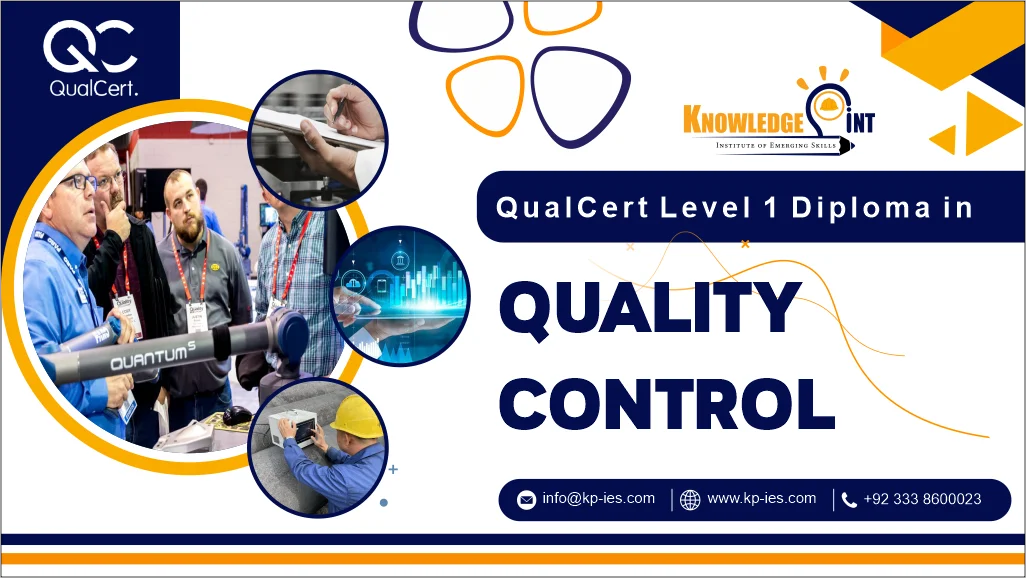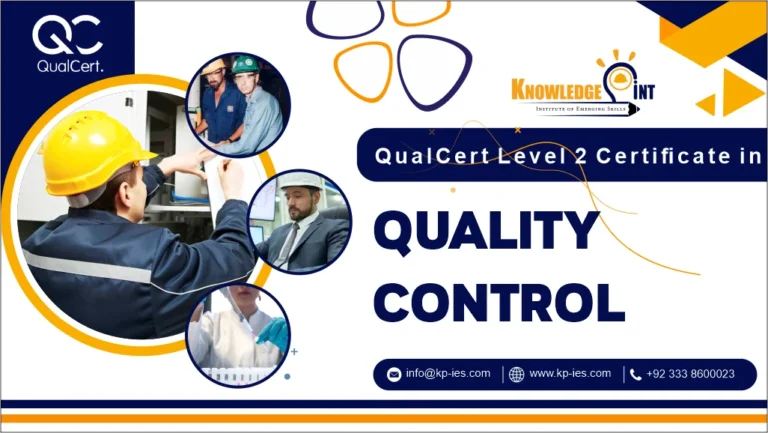In the dynamic landscape of modern industries, where precision and reliability are paramount, the Level 1 Diploma in Quality Control emerges as a gateway to a world of expertise and excellence. This diploma not only equips individuals with foundational knowledge in quality control but also sets the stage for a rewarding journey toward mastering the art of ensuring consistent and high-quality outputs across diverse sectors.
Quality control stands as the linchpin in the pursuit of operational perfection. The Level 1 Diploma in Quality Control is more than a qualification; it’s a roadmap for those eager to explore the intricacies of maintaining and enhancing product or service quality. Let’s delve into the key components that make this diploma a transformative experience.
The Level 1 Diploma in Quality Control is not just an academic achievement; it’s an initiation into a realm where precision meets passion, and excellence becomes a daily practice. As industries evolve, the need for skilled quality professionals becomes increasingly apparent. Embrace the Level 1 Diploma, unlock the doors to a world of possibilities, and embark on a career path where you don’t just ensure quality – you define it. The journey toward becoming a seasoned quality control expert begins here, at the foundation of knowledge and the commitment to maintaining the highest standards.
Course Overview
Upon successful completion of the Level 1 Diploma in Quality Control, participants will demonstrate proficiency in foundational concepts and practical skills related to quality control. The learning outcomes include:
- Comprehensive Understanding of Quality Control Principles:
- Articulate a thorough understanding of the fundamental principles that underlie quality control across diverse industries.
- Recognize the significance of maintaining and enhancing quality standards for organizational success.
- Advanced Application of Quality Control Tools and Techniques:
- Apply a diverse range of quality control tools and techniques, including statistical methods and advanced software applications.
- Demonstrate proficiency in utilizing these tools to monitor, analyze, and optimize processes effectively.
- In-Depth Knowledge of Roles and Responsibilities in Quality Control:
- Navigate the intricate network of roles within the quality control process, defining individual responsibilities and understanding the collaborative efforts required for success.
- Emphasize the pivotal role of communication in achieving and maintaining quality objectives.
- Mastery of Statistical Concepts Relevant to Quality Control:
- Apply advanced statistical concepts to analyze and interpret complex data sets relevant to quality control.
- Utilize statistical methods for making informed decisions, enhancing the overall quality control process.
- Advanced Documentation and Record-Keeping Skills:
- Emphasize the critical importance of meticulous documentation in quality control, especially in complex and regulated environments.
- Develop advanced skills in record-keeping to ensure traceability, accountability, and compliance with rigorous quality standards.
- Strategic Problem-Solving and Continuous Improvement:
- Cultivate strategic problem-solving skills to address complex quality-related challenges systematically.
- Implement advanced problem-solving methodologies to drive continuous improvement in the quality control process.
- Industry-Specific Quality Control Adaptation:
- Tailor and adapt quality control principles to the unique challenges and requirements of specific industries.
- Analyze and address industry-specific nuances to ensure effective quality control implementation.
- Leadership and Decision-Making in Quality Control:
- Demonstrate leadership skills within quality control teams or departments, taking on responsibilities for strategic planning and guiding teams toward operational excellence.
- Make informed decisions based on a comprehensive understanding of quality management principles.
By achieving these learning outcomes, participants will not only possess advanced knowledge in quality control but will also be equipped with the practical skills needed to lead and contribute significantly to quality management processes within their respective industries. The Level 1 Diploma in Quality Control serves as a cornerstone for those seeking to advance their careers and pursue leadership roles in quality management.
Course Benefits of the Level 1 Diploma in Quality Control (QC):
- Holistic Understanding of Quality Management:
- Acquire a comprehensive understanding of quality management principles, positioning yourself as a versatile professional capable of contributing to various aspects of organizational excellence.
- Advanced Problem-Solving Skills:
- Develop advanced problem-solving skills essential for addressing complex quality-related challenges systematically and strategically.
- Leadership Opportunities:
- Unlock leadership opportunities within quality control teams or departments, allowing you to guide teams toward operational excellence and contribute to strategic planning.
- Versatility Across Industries:
- Gain knowledge applicable to diverse industries, making you adaptable to the unique challenges and requirements of different sectors.
- Contribution to Organizational Excellence:
- Play a pivotal role in contributing to the overall excellence of an organization by ensuring high-quality outputs, services, and a culture of continuous improvement.
- Preparation for Advanced Certifications:
- Lay the groundwork for pursuing advanced certifications in quality control, providing a pathway for continuous professional development and specialization.
- Mastery of Quality Control Tools:
- Master the use of a diverse range of quality control tools, including statistical methods and advanced software applications, enhancing your effectiveness in monitoring and optimizing processes.
- Advanced Documentation Skills:
- Develop advanced documentation and record-keeping skills, crucial for ensuring traceability, accountability, and compliance with stringent quality standards, especially in regulated environments.
- Industry-Specific Expertise:
- Tailor and adapt quality control principles to the unique challenges and requirements of specific industries, positioning yourself as an industry-specific expert.
- Enhanced Communication Skills:
- Strengthen communication skills necessary for effective collaboration within quality control teams and conveying quality-related information to stakeholders at various levels.
- Decision-Making Excellence:
- Make informed decisions based on an advanced understanding of quality management principles and the ability to analyze complex data sets.
- Continuous Professional Development:
- Lay the foundation for continuous professional development, with the opportunity to stay updated on evolving trends, best practices, and emerging technologies in quality control.
- Strategic Role in Problem Resolution:
- Assume a strategic role in problem resolution, driving continuous improvement initiatives and contributing to the overall success of the organization.
- Leadership Recognition:
- Gain recognition as a leader within the quality control domain, establishing your credentials as a valuable asset in steering organizations toward operational perfection.
- Pathway to Higher Education:
- Use the Level 1 Diploma as a stepping stone for pursuing higher education in quality management or related fields, opening doors to advanced academic and professional opportunities.
The Level 1 Diploma in Quality Control offers a myriad of benefits, empowering participants with advanced knowledge and practical skills that go beyond the basics. Whether you are aiming for leadership roles, industry-specific expertise, or continuous professional development, this diploma provides a robust foundation for a successful and fulfilling career in quality management.
Study Units for the Level 1 Diploma in Quality Control (QC):
Module 1: Introduction to Quality Control
- The Role of Quality Control in Industries
- Historical Overview of Quality Control
- Quality Control vs. Quality Assurance
Module 2: Basic Quality Concepts
- Fundamental Quality Characteristics and Attributes
- Common Quality Terminology
- Cost of Poor Quality
Module 3: Quality Control Tools and Techniques
- Statistical Process Control (SPC)
- Root Cause Analysis (RCA)
- Failure Mode and Effects Analysis (FMEA)
- Pareto Analysis
- Control Charts, Histograms, Scatter Plots, and Other Graphical Tools
Module 4: Quality Standards and Regulations
- Industry-Specific Quality Standards (e.g., ISO 9001, AS9100)
- Regulatory Compliance and Quality
- Quality Auditing and Compliance Management
Module 5: Quality Inspection and Testing Methods
- Inspection Techniques and Procedures
- Sampling Plans (e.g., AQL)
- Precision Measurement and Testing Equipment
- Calibration and Validation
Module 6: Quality Management Systems (QMS)
- Introduction to Quality Management Systems
- Six Sigma and Lean Principles
- Total Quality Management (TQM)
- Continuous Improvement and Kaizen
Module 7: Advanced Problem-Solving
- Six Sigma DMAIC (Define, Measure, Analyze, Improve, Control) Methodology
- 8D Problem-Solving Process
- Advanced Root Cause Analysis Techniques
Module 8: Statistical Analysis in Quality Control
- Hypothesis Testing
- Regression Analysis
- Design of Experiments (DOE)
- Statistical Software Applications
Module 9: Quality Control Documentation and Reporting
- Record Keeping and Documentation Requirements
- Audit Planning and Execution
- Effective Reporting of Quality Control Findings
Module 10: Quality and Safety Integration
- The Interplay between Safety and Quality
- Ensuring Safe Quality Control Practices
- Risk Assessment and Safety in Quality Control
Module 11: Quality Assurance and Continuous Improvement
- Quality Assurance Principles
- Building a Culture of Continuous Improvement
- Benchmarking and Best Practices
This structured curriculum ensures that participants in the Level 1 Certificate in Quality Control course receive comprehensive training in foundational concepts and practical skills, preparing them to contribute effectively to quality control processes in various industries.
Future Progression for Level 1 Diploma in Quality Control Graduates:
- Level 2 and Advanced Quality Control Diplomas:
- Progress to higher levels of quality control diplomas or advanced certifications to deepen expertise and gain specialized knowledge in advanced quality management practices.
- Certification in Regulatory Compliance:
- Pursue certifications in regulatory compliance to strengthen your understanding of industry-specific regulations and compliance requirements, enhancing your role in maintaining quality standards.
- Master’s in Quality Management or Business Administration:
- Advance your education by pursuing a master’s degree, such as a Master’s in Quality Management or an MBA with a focus on quality and process improvement, opening doors to executive leadership roles.
- Certified Manager of Quality/Organizational Excellence (CMQ/OE):
- Attain the Certified Manager of Quality/Organizational Excellence (CMQ/OE) certification from the American Society for Quality (ASQ) to demonstrate mastery in quality management principles.
- ISO Lead Auditor Certification:
- Obtain ISO Lead Auditor certification, specializing in auditing quality management systems and ensuring compliance with international quality standards.
- Quality Control Leadership Positions:
- Progress into leadership positions within quality control departments or organizations, taking on higher-level responsibilities for strategic planning and organizational excellence.
- Lean Six Sigma Black Belt Certification:
- Pursue Lean Six Sigma Black Belt certification to enhance your expertise in process improvement methodologies and data-driven decision-making within quality control.
- Advanced Data Analytics and Machine Learning Courses:
- Enroll in advanced data analytics and machine learning courses to leverage data-driven insights for continuous improvement and predictive quality control.
- Project Management Professional (PMP) Certification:
- Acquire PMP certification to complement quality control skills with project management expertise, enabling efficient management of quality-related projects.
- Industry-Specific Specialization:
- Specialize further within your industry of focus, becoming an industry-specific expert in quality control and contributing to sector-specific best practices.
- Ph.D. or Doctorate in Quality Management:
- Explore opportunities for pursuing a Ph.D. or doctorate in quality management, engaging in research and contributing to the advancement of knowledge in the field.
- Quality Control Consultancy:
- Transition into a quality control consultancy role, offering specialized expertise to organizations seeking to enhance their quality management processes and compliance.
- Continuous Professional Development (CPD):
- Engage in continuous professional development through workshops, seminars, and conferences to stay updated on emerging trends, technologies, and best practices in quality control.
- Entrepreneurship in Quality Management:
- Explore entrepreneurial opportunities by establishing a quality management consultancy or offering specialized quality control services to businesses.
- Industry Leadership Associations:
- Become an active member of quality control and management associations, participating in leadership roles, mentoring, and contributing to the advancement of the profession.
- International Quality Control Standards:
- Explore certifications or training programs aligned with international quality standards, such as ISO 14001 (environmental management) or ISO 45001 (occupational health and safety).
By strategically pursuing these future progression avenues, graduates of the Level 1 Diploma in Quality Control can continuously elevate their expertise, contribute significantly to their organizations, and shape the future of quality management in diverse industries.







